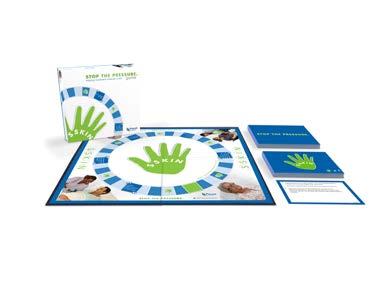&NURSING
GAME-BASED LEARNING FOR STAFF TRAINING














Serious Games for Staff Training in Care Homes
However, one solution that has gained popularity in recent years is the use of serious educational games to train staff. In this article, we will explore how serious games can address the problems and worries that care home owners face when it comes to staff training.
• Staff Retention: One worry that care home owners have about staff training is that it will make their employees more desirable to other companies, leading to a higher turnover rate. However, by providing engaging and enjoyable training through serious games, employees are more likely to feel valued by the care home. This can lead to increased job satisfaction and, higher staff retention rates.
• Cost: Providing traditional training methods, such as hiring external trainers or purchasing training materials, can be costly. However, serious games are a cost-
effective way of delivering quality training to staff. Our games do not require any expensive external support and can be used multiple times, reducing the overall cost of training. Additionally, serious games can be used to supplement existing training methods, providing an alternative and more engaging way to reinforce learning.
• Time: Staff training can be a time-consuming process that takes away from the day-to-day operations of the care home. However, serious games can be completed in short bursts, allowing staff to fit training around their work schedule. This can help reduce the amount of time that staff need to spend away from their duties while still ensuring they receive the necessary training.
• Compliance: As a care home owner, it is your legal responsibility to ensure that your staff have received the necessary training to provide safe and effective care. Serious games can help you meet these requirements by providing an interactive and engaging way for staff to learn and demonstrate their understanding. This can help ensure that your care home is compliant with regulations and standards.
• Quality of Training: Serious games are designed to be engaging and effective, making them an excellent way to deliver quality training to your staff. Through interactive scenarios, staff can learn
and practice skills in a safe environment, without risking the safety or well-being of residents. This can help to increase staff confidence and competence, leading to better quality of care for residents.
• Keeping up with Industry Changes: The care industry is constantly evolving, and it can be challenging to keep up with the latest best practices and standards. However, by using serious games, you can easily update your staff training to reflect changes in
the industry. This can help to ensure that your staff have the most up-to-date knowledge and skills, leading to better quality of care for residents.
From increased staff retention rates to costeffective training methods, serious games offer numerous benefits to care home owners. Additionally, the interactive and engaging nature of educational games can help to increase staff confidence and competence, leading to better quality of care for residents.


www.focusgames.com

As a care home owner or manager, you face the challenge of providing high-quality training to your staff while balancing the cost, time, and compliance requirements that come with it.
Co-Development of a Digital Intervention to Aid Decision-Making that Supports Minimal Use of Restrictive Practice in Care Homes
Dr Gary Mitchell | Senior Lecturer (Education) | Queen’s University Belfast E: Gary.Mitchell@qub.ac.uk | Twitter: @GaryMitchellRNMaintaining safety can be challenging for care homes due to the range of complex medical conditions with which their residents live (for example dementia, frailty, complex mental health behaviours and learning disabilities). Sometimes care home staff utilise restrictive practice with the primary purpose of ensuring the safety of their residents. Nonetheless, they must remain cognisant about the regional, national, and international legislation relating to the use of restrictive practice (General Assembly of the United Nations, 1948; Council of Europe, 1950; Donald et al. 2009; Freeman, 2011). As such, restrictive practice may indeed improve resident safety, but it is very often something which also deprives people of
their freedom. Restrictive practice within care home settings is a complex issue for the care home organisations, care home staff, their residents, and relatives.

To our knowledge, there have been limited educational interventions which have supported care home nurses to identify restrictive practice, understand the associated legal and ethical issues and provide practical, evidence-based support with regards to decision-making about restrictive practice.
As a result, Queen’s University Belfast and Focus Games Ltd received funding from the Burdett Trust for Nursing to codesign a digital resource to aid decisionmaking that supports minimal use of restrictive practice in care homes. The digital intervention was co-developed using existing legislation, clinical
guidelines and evidence relating to restrictive practice (e.g., Mental Capacity Act NI, 2016) alongside the experience of older people, family members/carers of older people, care home healthcare staff and other key stakeholders using co-design methodology. The e-resource can be accessed here:

https://play.restrictivepractice.co.uk/
www.riseandshinegame.com
In a sample of 203 care home nurses, we saw improvements in knowledge and self-efficacy about how to use alternative strategies to restrictive practice. Before using the educational resource, the group of care home nurses had a mean score of 34/65 (52%). After completing the educational resource, the group of students had a mean score of 55/65 (85%), reflecting an increase in knowledge and self-efficacy score of 33%. When analysed using a pairedsamples t-test, this increase from pre-test to post-test was statistically significant (p<0.001).
Following receipt of the e-resource about restrictive practice, we also asked care home managers to conduct an audit before and three months after learning to determine if the staff education had led to changes in practice. On posttest analysis, we determined that there were statistically significant reductions in the amount of restriction used across 15 nursing homes in Northern Ireland because of this learning (e.g., reductions in the use of lap belts and bed rails). The findings of this intervention are currently being written up for publication with the e-resource.
Further to this, Queen’s University Belfast and Focus Games Ltd have subsequently received funding for two further projects in care homes. The first is funded by Northern Ireland
Chest Heart & Stroke and is about codeveloping an e-resource to support nursing care of residents living with heart failure in care homes. The second project is funded by the Burdett Trust for Nursing and is about co-developing an e-resource to optimise diabetes care to residents living in care home settings. References available on request.
KEEP YOUR STAFF EXCITED & ENGAGED WITH TRAINING
Recognise and minimise dehydration for patients, residents and staff.
Understand malnutrition and improve how you support people to eat & drink.
Recognise and reduce avoidable pressure ulcers.
Competency assessment tool for Care Certificate training.

Our game-based educational tools engage, inform & enrich.



Learn more at: shop.focusgames.com

Rise and Shine with Internationally Renowned Artist and Sculptor Bob Olley

South Tyneside and Sunderland NHS Foundation Trust has 7 Care of the Older Person wards.

As part of The Older People’s Improvement Collaborative (TOPIC) the idea came up to create a fun way to complement physical activity.
The result was a game which has seen teams of specialists, a loved one and a North East artist and sculptor working together to launch a game which is helping patients get back on their feet.
Getting up and moving is particularly important for people aged 80 and over. They can lose 10% of their muscle mass for every 10 days they spend in hospital – the equivalent of 10 years of ageing (Amora, A. 2021 Time to move again: from deconditioning to reconditioning, Age and Ageing, Volume 51, Issue 2 [Online], Available at:-https://doi. org/10.1093/ageing/afab227)
Encouraging people to get out of bed, get dressed, sit up and stay active are vital steps in ensuring they do not spend any longer than needed for their care and recovery in hospital.
This is because what is known as deconditioning can lead to harm such as increased falls risk, muscle weakness, increased confusion, constipation and incontinence.
They can also experience a drop in their appetite and increased risk of swallowing problems, which can lead to pneumonia.
The aim was to encourage a fun approach to physical activity on these Older Persons’ inpatient wards and something which made moving fun for
patients and staff too.
TOPIC also wanted to set up a ward-based activity so everyone has an opportunity to take part when they are ready (clinically and personally).
Staff from two wards, the Quality Improvement Team and a relative, local artist and sculptor and member of the TOPIC programme board Bob Olley were involved in coming up with ideas which led to the creation of the game, Rise and Shine.
A game was developed using coaster size tiles, decorated with creative artwork which prompts conversation amongst its players.
Patients are encouraged to select a tile then post it in a post box, taking part in some form of physical activity, such as walking 10 steps.
Once the patients have completed their activity and everyone has taken part, a tile is picked at random and the player who posted the winning tile receives a small prize.
Following a trial period involving patients and staff on the two of the wards qualitative feedback was gathered to help review its success.
With support from the Trust’s Innovation Team, the TOPIC team has worked with Focus Games to develop the idea and manufacture a game.
Rise & Shine game is launching May 2023 and can be pre-ordered. It will be use on all of our Care of the Elderly wards and be available for others to benefit from too.

www.riseandshinegame.com
Reason for involvement.
Having experienced the problems of caring for my late mother and her sister, both in their mid-nineties, I found that keeping them occupied and motivated was most challenging.
However they both had a passion for playing bingo which gave them an interest and contact with others of their years.
Three times a week they attended the bingo hall often returning with a win. Armed with this knowledge I based “Rise and Shine” on their love of the game.
Rise and Shine does not take long which eliminates the loss of concentration, it has an element of fun re. the humorous illustrations on each of the “cards” and for the winner there is a small gift. In order to take part the patients are encouraged to get out of bed, get dressed and enjoy a game of “Rise and Shine.”
A game which appeals to a patient’s competitive streak is helping to get them movingRobert Olley North East artist and sculptor.
The Importance of Mental Health Awareness and Mental Health First Aid
Nicola J StockAn awareness of mental health and a knowledge of mental health first aid can be beneficial for both the individual and others around them. The link between mental and physical health:
Mental health is just as important as physical health and there is a clear link between the two; if someone has a long-term physical illness, their mental health is likely to be affected and vice versa, those with long-term mental health problems are more likely to have an illness such as a heart condition and many have associated physical symptoms. Depression can cause headaches and fatigue for example, and anxiety can lead to problems with digestion. Positive mental health could be seen as part of our general sense of wellness.
Encouraging positive mental health and wellness:
The NHS highlights five steps that we can all take to improve our mental health and wellbeing:
1) Connect with other people, inperson and face-to-face as well as via technology or social media.

2) Be physically active by doing something you enjoy: walking the dog, playing with children, taking part in a sport etc.
3) Learn new skills. This could be a new recipe, learning how to fix something or a craft activity for example.
4) Give to others. An act of kindness creates positive feelings and giving someone your time can be greatly appreciated.
5) Pay attention to the present moment (mindfulness). This includes your thoughts and feelings, your sense of your body and the world around you.
What is mental health first aid?
In the same way that a workplace first aider would not expect to fix a suspected broken ankle but would support the injured person and signpost them to the appropriate place where they can receive the necessary diagnosis, management and support. So a mental health first
aider is not expected to either diagnose a mental health problem, or offer any treatment. The mental health first aider’s role is twofold – to be a point of contact for a colleague who is experiencing a mental health issue or emotional distress and to contribute to creating a positive environment for mental health in the workplace.
How does a mental health first aider support someone?
The interaction between a mental health first aider and a colleague in distress could range from recognising that someone is struggling, to having an initial conversation, through to supporting the person to get the appropriate help. In day-to-day interaction with colleagues, mental health first aiders are taught the importance of informal discussions
about wellness, stress, depression and anxiety for example and how these conversations can reduce stigma.
Helping to build a healthy workplace environment will not prevent or reduce all mental health problems as the workforce may still experience life traumas elsewhere, but a toxic work environment, if it exists, will inevitably be the cause of some workers experiencing mental health problems. In addition to employing or training mental health first aiders, employers can have steps in place to help their workforce build mental strength and improve their resilience so that they can stay as healthy as possible.
Nicky is an Emergency Nurse Practitioner, Lecturer and Mental Health Awareness Trainer. She is also a Mental Health First Aid instructor for various awarding bodies.

www.mentalhealthgame.co.uk

The Rise and Shine Game was created to encourage mobility in patients with a focus on the elderly community.
It is primarily intended for hospital patients and care home residents who may have more of a challenge being able to move freely.
Designs created by Bob Olley in collaboration with South Tyneside and Sunderland NHS Foundation Trust

Launching May 2023 - Available to pre-order at:
www.riseandshinegame.com
CARE CERTIFICATE GAME
The Care Certificate game is an effective face-to-face learning and competency assessment tool for all health and social care providers. It helps to deliver the knowledge and skills required to demonstrate competency for anyone new to health and social care.


The game was developed with leading practitioners, academics and trainers from health and social care. The game is directly mapped to key learning components of the Care Certificate.
Supporting and training staff who are new to care is a challenge for all employers of health and social care support workers. This game makes this process more effective while minimising the drain on time, resources and money.
Team Resilience
As the owner or manager of a care home in the UK, you know better than anyone the importance of teamwork in health and social care. With the current pressures facing us, such as staff shortages and concerns about delivering safe services, it’s more important than ever to have a resilient team.


But what exactly is resilience? Simply put, it’s the ability to withstand or recover quickly from difficulties. And in health and social care, we’ve certainly faced our fair share of difficulties over the past few years. The American Psychological Association has identified four core competencies of resilience:
• Connection
• Wellness
• Healthy thinking
• Meaning.
To achieve resilience in your care home, you need to be part of a strong team. And when we say “team,” we don’t just mean the people you work with. It’s also the people who support
you, who pick you up when you’re down, who share your successes, and who are working towards the same goals as you.
It’s important to remember that being resilient doesn’t mean never stumbling or falling. It means being able to pick yourself up time and time again. And when the pressure increases, it’s even more important to have the support of your team.
We understand that team meetings may be cancelled due to current pressures and staff shortages. However, team meetings are invaluable during times of pressure because they help us feel part of a common effort and remind us that we have each other’s backs. They also give us the opportunity to recognise each other’s efforts and let others know

they’re not alone during tough times. Ultimately, it’s your team that will help ensure the four core competencies of resilience are met. So, make sure you prioritise building a strong team, and don’t hesitate to lean on them during difficult times.
Cambridgeshire and Peterborough
Integrated Care System - Staff Support Hub developed the Team Resilience Game. The game presents information about work-related stress in an interactive and non-judgmental way. It empowers players to share their experiences and their concerns. It brings people together to learn new ways of supporting each other.
www.teamresiliencegame.co.uk

